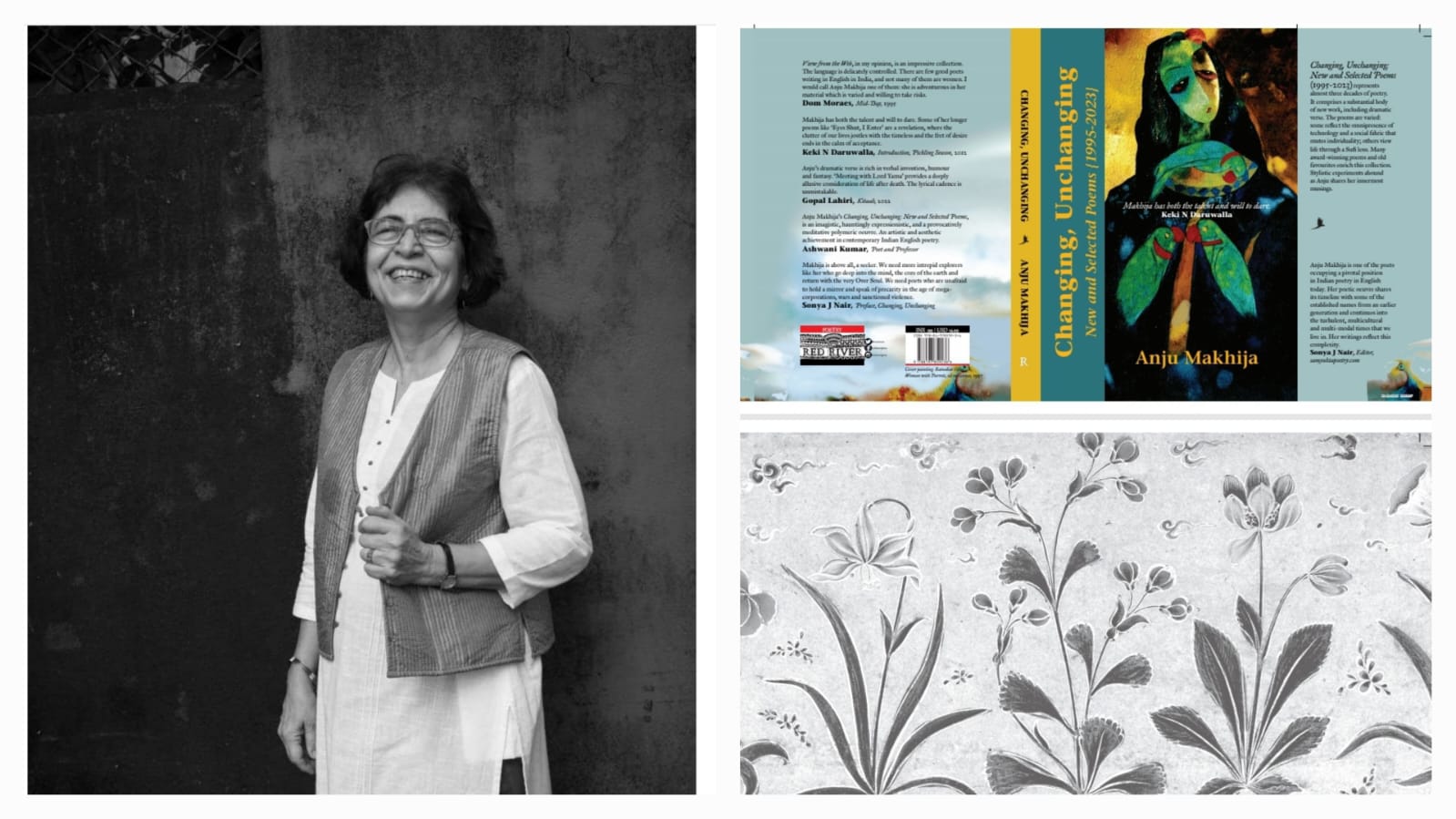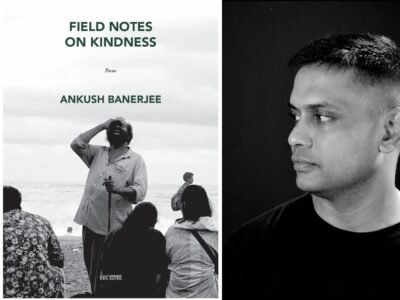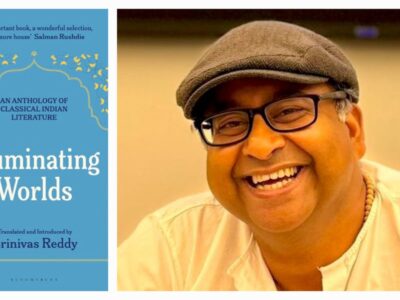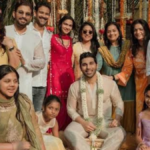“Chirpy, candid, effervescent; that’s how I remember, poet, playwright, writer, Anju Makhija,” writes Jhilam Chattaraj. Fridaywall is delighted to feature her latest book, Changing, Unchanging: New and Selected Poems (1995-2023) published by Red River Press
Book in Focus: Changing, Unchanging: New and Selected Poems by Anju Makhija
Anju Makhija’s Changing, Unchanging: New and Selected Poems (1995–2023) is a compelling collection that traces the evolution of a poet deeply engaged with the contradictions of life, death, and social realities. The book’s strength lies in its dramatic and tonal diversity, where Makhija’s verses often feel like a “contact sport,” playfully yet fiercely sparring with themes of mortality and societal dissonance, notably in poems involving mythic figures like Yama, the god of death (Bangalore Review). This interplay of myth and reality underscores a molecular metamorphosis of perspective, making the collection essential for understanding human growth and change (Outlook India).
However, some critiques point to unevenness in the collection’s excerpts, with surreal and fantasy elements sometimes feeling incomplete or disjointed (“Meeting with Lord Yama,” for instance) (Cafe Dissensus). Despite this, Makhija’s skillful lightness of touch when addressing grim social situations shines through, imparting a matter-of-fact reality that resonates deeply (BookReviewsAsia). The poems’ contradictory and complementary nature invites readers into a complex dialogue between change and permanence, highlighting Makhija’s verbal inventiveness and daring spirit (Outlook India, Pagdandi).
Overall, Changing, Unchanging is a richly textured and mature work that challenges and charms—revealing the poet’s persistent quest to capture the flux and fixity of existence.
About the Poet:
Anju Makhija is a distinguished Sahitya Akademi award-winning poet, playwright, and translator whose literary career spans multiple genres and decades. She has authored four poetry collections, including View from the Web and Pickling Season, and her latest work, Changing, Unchanging: New and Selected Poems (1995–2023), reflects the evolution of a poet deeply engaged with themes of transformation, mortality, and social realities.
In addition to her original poetry, Makhija has co-translated significant works such as Freedom & Fissures and Seeking the Beloved: The Mystical Verse of Shah Abdul Latif. She has also co-edited three anthologies focused on women, Indo-English theatre, and young readers. Her dramatic work, Mumbai Traps: Collected Plays, is widely recognized and accessible, showcasing her versatility beyond poetry.
Makhija’s accolades include The Sahitya Akademi English Translation Prize, The All India Poetry Competition, The BBC World Regional Poetry Prize, and The Charles Wallace Trust Fellowship. She has served on the English Advisory Board of the Sahitya Akademi, New Delhi, for five years and is the co-founder of the Pondicherry/Auroville Poetry Festival, highlighting her active role in the literary community.
Her poetry is marked by verbal inventiveness, theatricality, and a lightness of touch when addressing complex social issues, making her work a vital contribution to contemporary Indian English literature.
A Few Poems from Anju Makhija’s Changing, Unchanging: New and Selected Poems
An Order for a New Head
Small please, grey and white cells, pink too
(with bits and bytes).
Make the numbers even, enough odd ones.
Mould the skull with RDX plastique, the stick-fast variety.
Set the teeth firmly, rattling disturbs infants.
Keep the tonsils, I like to trap irritants for happy days.
One ear is plenty, bomb blasts are deafening in stereo.
Make the nostrils narrow, like a bone marrow —
air enough to live.
Now the main request: give me a third eye
(like the one on the truck).
A bright red light between two headlights
peering through the throat of a village road.
That’s all.
Brandy, I and the third eye. In the moonlight…
coconut trees, omnipresent Gods; two Gods too many.
Papayas, pulpy breasts, squeeze them dry.
Falling twigs, a shower of snakes;
swallowing them. I emerge Medusa!
Shedding my skin, I recoil in the armchair,
lost to the world.
Get the picture?
I’m Lao-Tzu smiling at Mona Lisa.
Breakpoint
Ruffling
feathers
from concrete treetops,
grabbing,
swinging,
towards madness edging.
Running
in circles of deceit.
Synthetic smiles.
repeated follies,
pray —
who’s pouring drinks?
Recurring
echoes of withdrawal;
denouncing,
shedding skins
of make-up
and Bond Street.
Rankling
tensions telling;
male, male
go away,
give me some
minutes to pray.
Razing
uprooting the soul,
holy —
wholly empty —
please,
touch me.
Pickling Season
Every summer, we laze under the mango tree
discussing unpatented recipes. When raw mangoes
drop on our head, we pause
to appreciate nature’s bounty.
Then on to peeling, chopping, salting,
boiling, spicing, bottling…
Will the sorcery work?
By year’s end, we hope, when
the pungent brine matures to its prime.
The zing depends on turmeric balancing the tamarind,
the chilli complementing the amchur,
and if the asafoetida poured in candlelight
late one night works for pickles
as it seldom does for couples, apart
since the first pickling season.
The alchemy has rarely bewitched,
jaggery sours, vinegar sears the tongue.
To change the recipe we’ve tried
with old ladies’ advice,
but nature moves inexorably,
and life proceeds predictably
beneath the mango tree.
Rendezvous with Ex-Lovers
Majnus, when remembered at meals
on tables with a checkered cloth,
and a single rose in the flower vase,
add a pinch of pepper to salted wounds.
Haldi transforms from yellow to blue,
garam masala heats the blood,
mint cools the split-pea soup.
Stiff beans outshine honey-glazed carrots,
the map of yesteryears defuses
with alarming ease on the yoghurt plate,
white and smooth to touch, sour on the palate.
Faces emerge in the grilled pomfret:
you hang a fork and knife on either ear,
sprinkle red chillies in the eyes,
carve the lips, shear off the sneer.
Your present beau peers from behind,
says, ‘hello, how do you do’
to the Don Juans in front of you.
From the gravy, they frown
threatening to choke and drown.
Saffron threads rise from the shrikhand
on heads almost bald and round.
Plucked out on stressed syllables,
ouch, they howl, lady you’re playing foul!
My past in Darjeeling tea I read,
the future in Napolean cognac.
Blowing out the candle,
I bid adieu to lingering ghosts
threatening to tuck me to bed.
Anju Makhija on Facebook (www.facebook.com/AnjuMakhijaPro) and Instagram (www.instagram.com/anjumakhijawrites).
About poet, writer and curator Jhilam
Jhilam Chattaraj is an academic, critic and poet. She teaches at the Department of English and Foreign languages, RBVRR Women’s College, Hyderabad. She has authored the books: Sudeep Sen: Reading, Writing, Teaching, Noise Cancellation (2021), Corporate Fiction: Popular Culture and the New Writers (2018), and When Lovers Leave and Poetry Stays (2018). Her works have been published in Michigan Quarterly Review, Mekong Review, Ecocene, New Contrast Magazine, One Art Poetry Journal,Calyx, Ariel, Room, Porridge, Queen Mob’s Tea House, Colorado Review,World Literature Today and Asian Cha among others. She received the CTI Excellence Award in ‘Literature and Soft Skills Development’ (2019), from the Council for Transforming India and the Department of Language and Culture, Government of Telangana, India. Her poem, ‘Sari’ was nominated for the Nina Riggs Poetry Award (2023).
















